Shift focus beyond academic excellence and prioritise what truly matters in youths’ learning, school and overall life experience.
Youth Purpose at the Heart of Student Well-Being
 How Findings from Youth Purpose Research Can Help Students?
How Findings from Youth Purpose Research Can Help Students? - To transform and reimagine schools with a new educative purpose post-pandemic, it is vital that schools move beyond academic performance outcomes to finding purpose.
“The biggest problem growing up today is not actually stress, it’s meaninglessness.”
– Professor William Damon, Director of the Stanford Centre on Adolescence, Stanford University
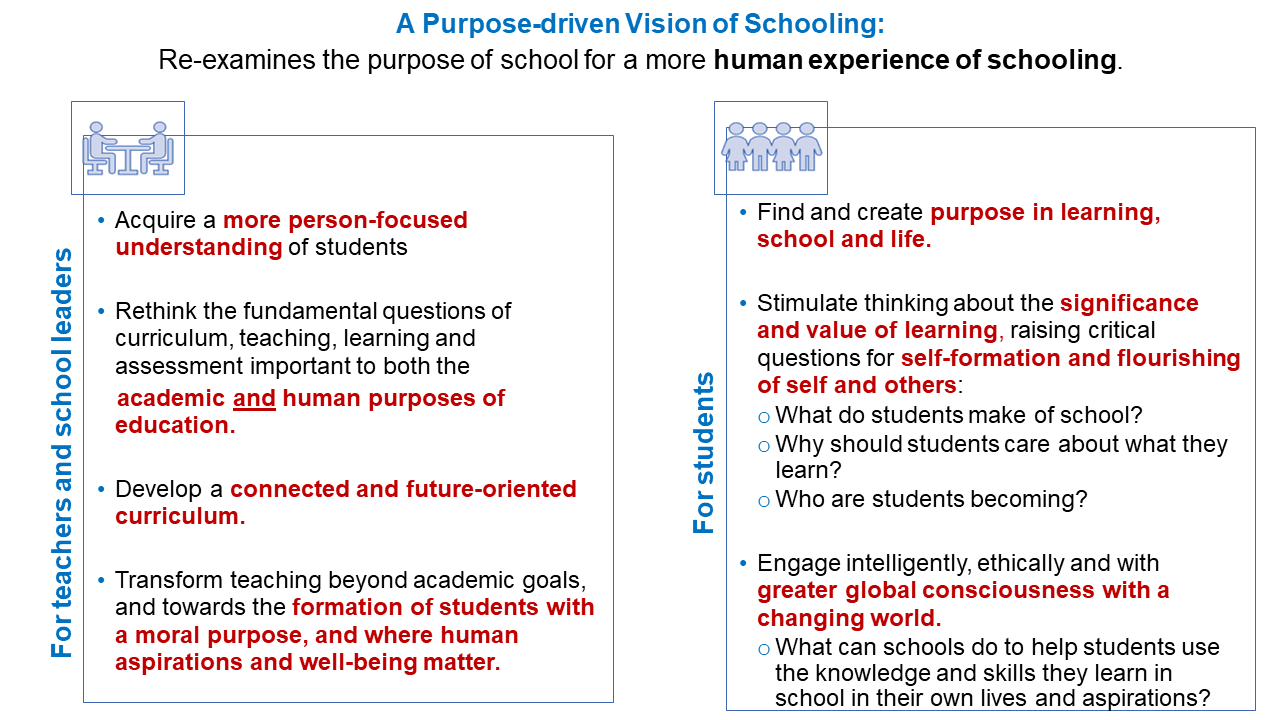
 Why is Youth Purpose at the Heart of Student Well-Being?
Why is Youth Purpose at the Heart of Student Well-Being?
Purpose is defined as a long-lasting intention to accomplish something that is meaningful not only to self but to the world beyond self (Damon, 2008). All young people are capable of discovering life purposes, and purpose is positively related to life satisfaction or well-being.
Educational change scholars in recent years have called for a focus on students as partners in change and leadership (Hargreaves & Shirley, 2009). This involves a deeper look into the complexity of students’ learning and lives in the design of meaningful educational experiences. Worldwide, the predominant focus is on academic excellence in schools.
 How Was the Research Carried Out?
How Was the Research Carried Out?
The Youth Purpose research used a quantitative and qualitative research design with questionnaires, focus group discussions and clinical interviews. About 600 Singapore and 200 Israeli 15-year-old adolescents completed four questionnaires:
- Life Goals Questionnaire (Roberts & Robins, 2000)
- Meaning in Life Questionnaire (Steger et al., 2006)
- Child and Adolescent Social Support Scale (Malecki & Demaray, 2002)
- Satisfaction with Life Scale (Diener et al., 1985)
Twenty-eight Singapore students were interviewed individually; ten students were interviewed individually a second time one year later to examine stability of responses and obtain further elaboration.
 Evidence from Youth Purpose Research
Evidence from Youth Purpose Research
Project focus | What project uncovered |
- What really matters in high-performance schooling in Singapore?
- Upstream focus on a more purpose-driven, human-centred experience of schooling gets to the root of many downstream mental well-being and mental health issues.
- Raise critical questions of purpose and meaning through examining the human aspects of students’ experiences of schooling.
- Novel cross-national research between Singapore and Israel.
- Both are small nations with common traits of self-reliance and determination to thrive under prevailing local, regional, and global tensions.
- Both value education highly.
| - The tensions and paradoxes in Singapore schooling
- Students’ actual engagement and motivations with school learning (or lack of) impacted students’ learning and well-being
- What matter in students’ learning, school and life experiences?
- Do students in Singapore schools have meaningful purposes to commit themselves to?
- What is the nature of adolescent purposes that might inspire students?
- How have students developed such purposes and meanings?
- What are the comparative levels of youth purpose, meaning in life, social support and life satisfaction among adolescents in Singapore and Israel?
|
- Highlight the fundamental questions of “why” and “what for” so that schools can lead the future of education and guide students to make purposeful and ethical decisions for themselves and the larger community.
| - It is important to stimulate discussion about what schools and teachers can do to guide students with finding and creating purpose and meaning in learning, school and life.
- Failure to address the “why” of schooling and learning may lead to a sense of meaninglessness and a lack of purpose among students.
- High achievement without purpose is not sustainable in the long term – students “do” school and can be high achieving but have low purpose that stunts personal growth and well-being.
|
1. Purpose and meaning in life
- Youth’s purpose, meaning in life and social support systems significantly influence students’ school and life satisfaction.
- Have self-goals and often a beyond-the-self purpose orientation.
- Students with self- and other-focused purpose orientation as compared to those with no-orientation perceived significantly higher support from parents, teachers, and people in school.
2. Social support, satisfaction with school and life or well-being
- Discovering and developing youth purpose needs to be supported, otherwise it is ad-hoc and left to chance.
- Support from parents was the strongest predictor of school and life satisfaction.
- Adolescents typically turn to parents and teachers for bigger life issues, and to close friends for school issues.
3. Comparative findings between Singapore and Israel
- While Israel seeks to improve its educational achievement metrics, it is notable that its students, unlike those in Singapore, have a greater sense of purpose, presence of meaning and significantly higher school and life satisfaction.
 What Does This Mean for Youth Purpose in Schools?
What Does This Mean for Youth Purpose in Schools?
Youth purpose can serve as a moral compass for life.

A purpose-focused education with a connected and future-oriented curriculum may engender greater purpose in schooling as students find greater meaning, significance and value in their learning.
 What Should Teachers Do?
What Should Teachers Do?
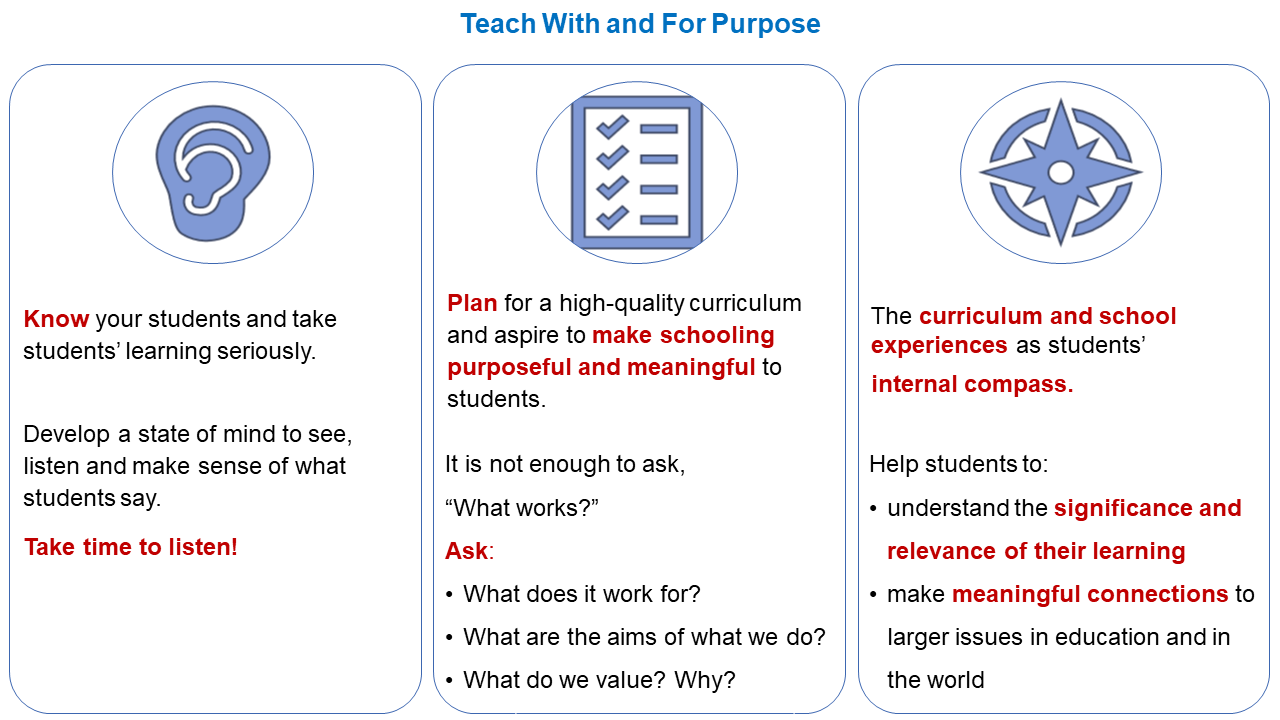
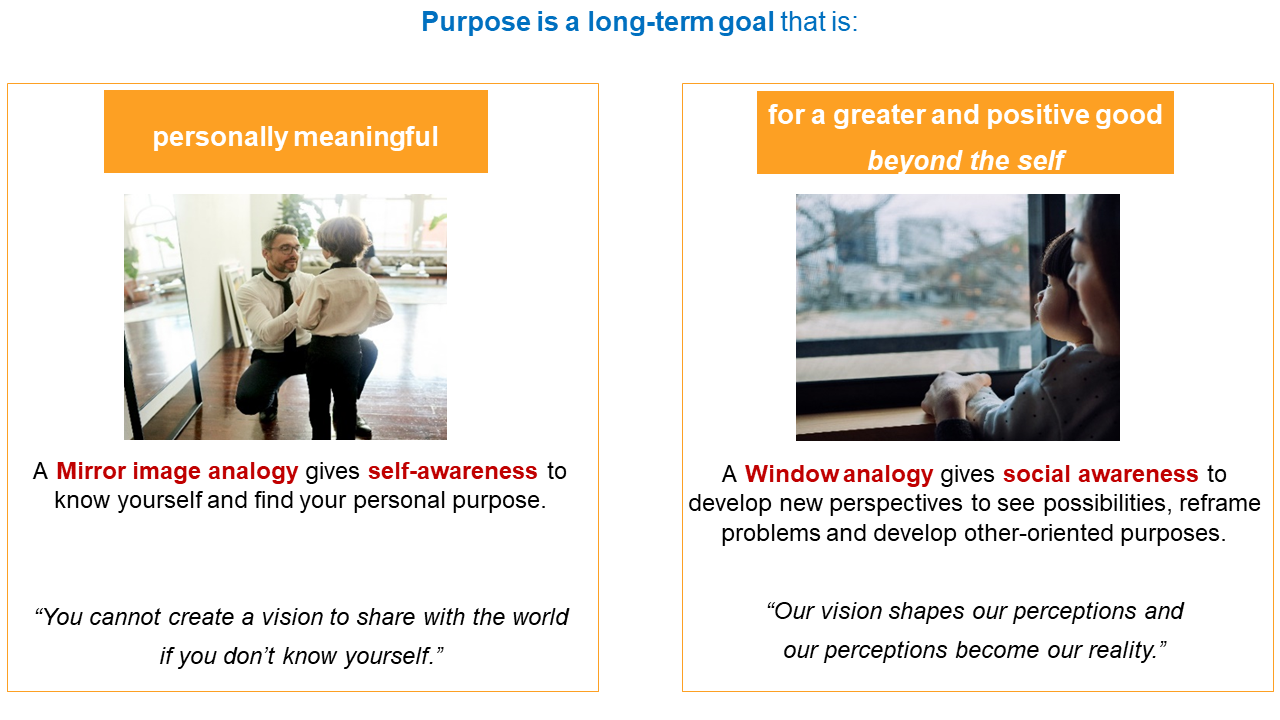
 Some Examples for Teaching and Teacher Professional Development
Some Examples for Teaching and Teacher Professional Development
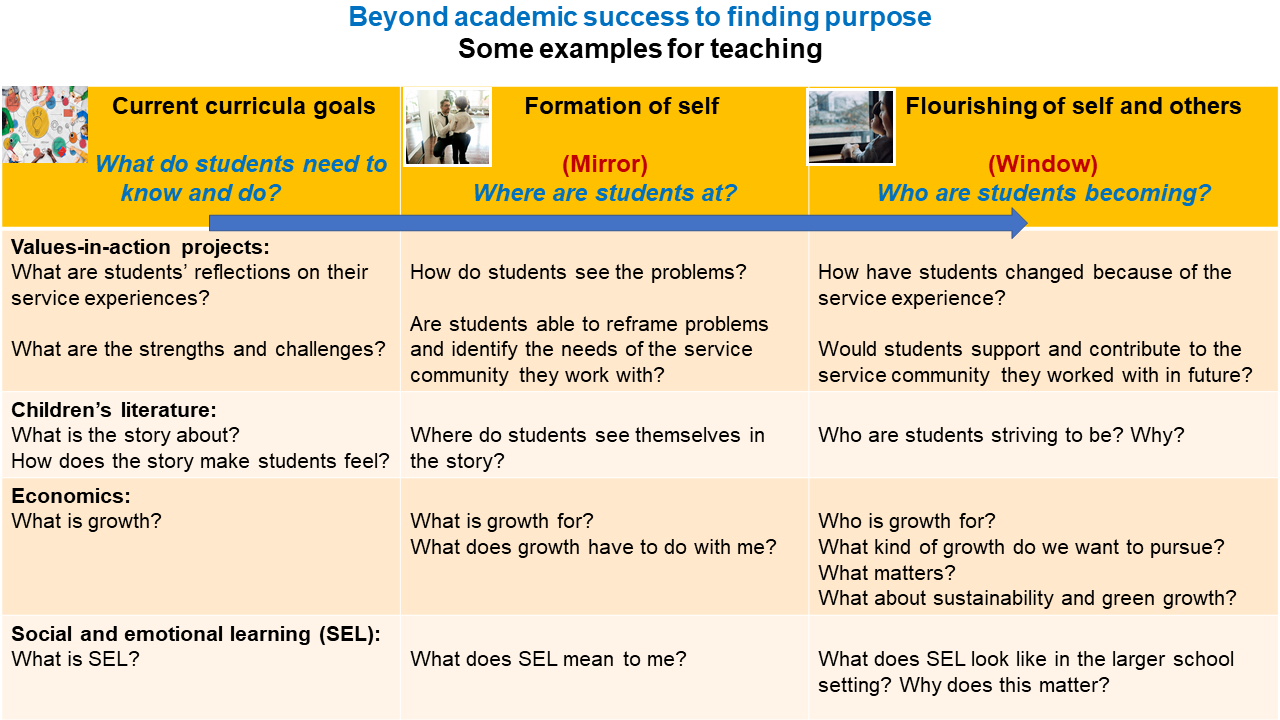
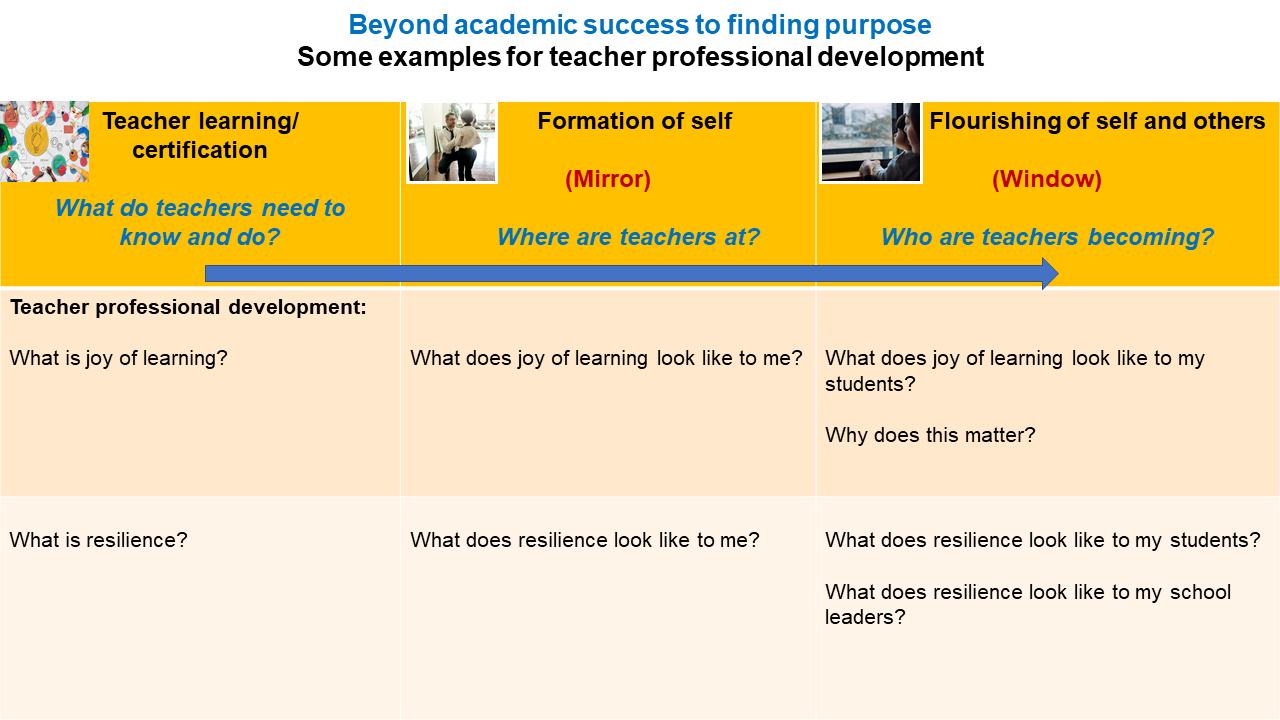
 Related Links
Related Links
 Further Readings
Further Readings
For educators interested in finding out more about the Youth Purpose research and related references, you may refer to:
- Heng, A., & Pereira, A.(2020) Understanding adolescent purpose in the context of high-performance schooling in Singapore. Cambridge Journal of Education, 50(5), 539-558
- Heng, M. A., Fulmer, G. W., Blau, I., & Pereira, A. (2020). Youth purpose, meaning in life, social support and life satisfaction among adolescents in Singapore and Israel. Journal of Educational Change, 21,299–322
- Heng, M. A., Blau, I., Fulmer, G. F., Bi, X., & Pereira, A. (2017). Adolescents finding purpose: Comparing purpose and life satisfaction in the context of Singaporean and Israeli moral education. Journal of Moral Education, 46(3), 308-322
Other references:
- Biesta, G. (2009). Good education in an age of measurement: On the need to reconnect with the question of purpose in education. Educational Assessment, Evaluation and Accountability, 21(1), 33–46.
- Biesta, G. (2010). Why ‘what works’ still won’t work: From evidence-based education to value-based education. Studies in Philosophy and Education, 29, 491–503.
- Bronk, K. C., Finch, W. H., & Talib, T. L. (2010) Purpose in life among high ability adolescents, High Ability Studies, 21(2) 133-145.
- Damon, W. (2008). The path to purpose: How young people find their calling in life. New York, NY: Free Press.
- Diener, E., Emmons, R. A., Larsen, R. J., & Griffin, S. (1985). The Satisfaction With Life Scale. Journal of Personality Assessment, 49(1), 71.
- Han, H. (2015). Purpose as a moral virtue for flourishing. Journal of Moral Education, 44(3), 291–309.
- Hargreaves, A., & Shirley, D. L. (2009). The fourth way: The inspiring future for educational change. Thousand Oaks, CA: Corwin Press.
- Malecki, C. K., & Demaray, M. K. (2002). Measuring Perceived Social Support: Development of the Child and Adolescent Social Support Scale (Casss). Psychology in the Schools, 39(1), 1-18.
- Roberts, B. W., & Robins, R. W. (2000). Broad dispositions, broad aspirations: The intersection of personality traits and major life goals. Personality and Social Psychology Bulletin, 26(10), 1284–1296.
- Shirley, D. (2017). The new imperatives of educational change: Achievement with integrity. London: Routledge.
- Steger, M. F., Frazier, P., Oishi, S., & Kaler, M. (2006). The meaning in life questionnaire: Assessing the presence of and search for meaning in life. Journal of Counseling Psychology, 53(1), 80–93.
 Research Projects
Research Projects
The following projects are associated with Youth Purpose Research:
 Research Team
Research Team
To learn more about this research, please contact Associate Professor Mary Anne Heng at maryanne.heng@nie.edu.sg
Principal Investigator
A/P Mary Anne Heng, Policy, Curriculum and Leadership (PCL), NIE
Co-Principal Investigators
A/P Jiang Heng, PCL, NIE
Dr Tan Chee Soon, Psychology and Child & Human Development (PCHD), NIE
Collaborators
Prof Ina Blau, The Open University of Israel
Dr Gavin William Fulmer, University of Iowa (formerly of NIE)
Dr Tan Liang See (formerly of NIE)
Research Associates
Dr Andrew Pereira, Office of Educational Research (OER), NIE
Dr Bi Xiaofang, Institute for Adult Learning, Singapore University for Social Sciences (formerly of NIE)
 Acknowledgements
Acknowledgements
Youth Purpose Research was funded by the Education Research Funding Programme, National Institute of Education, Nanyang Technological University, Singapore (project no. OER 10/13 MAH & RS 7/16 MAH). Any opinions, findings, and conclusions or recommendations expressed in this material are those of the author(s) and do not necessarily reflect the views of the Singapore MOE and NIE.
Some of the examples for teaching and teacher professional development were developed together with the inspiring teachers and education leaders who attended A/P Mary Anne Heng’s class in the Joint NIE, NTU and Teachers College, Columbia University Master of Arts in Leadership and Educational Change programme in 2021.
This knowledge resource was written by A/P Mary Anne Heng, Dr Tan Chee Soon, Dr Lynn Chiam, Ms Monica Lim and Mr Jared Martens Wong on 21 December 2021.